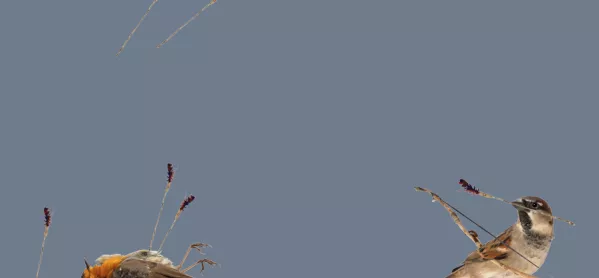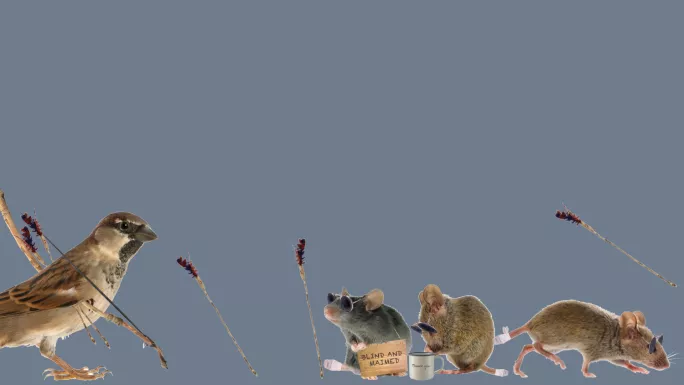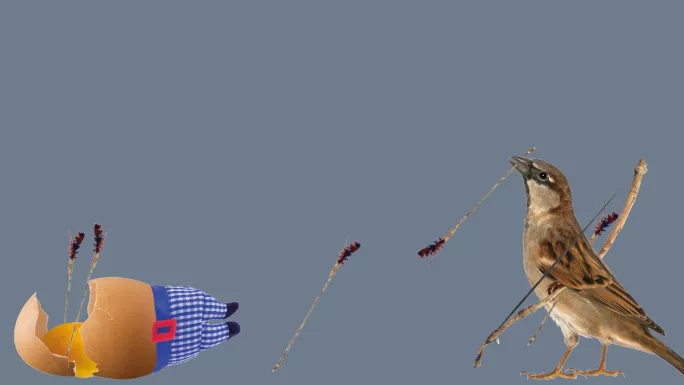- Home
- Who killed Cock Robin?
Who killed Cock Robin?

I have a clear memory of the first poem that moved me to tears as a child. I grew up in Liverpool during the war, with death, tragedy and devastation surrounding me, but when I read Who Killed Cock Robin, I was far more concerned about the fate of the hero than I was about German bombs. I didn’t quite know what a cock robin was, but it was very sad all the same.
As a young boy, I knew many of these curious little songs and rhymes. I don’t remember learning them; they were just part of the joy of growing up. We sang them at home, chanted them at school.
Such wonderfully nonsensical rhymes, tiny rhythmic stories about people and animals, sometimes with a moral, always with a beginning, a middle and an end: Hickory Dickory Dock, Incy Wincy Spider, Little Miss Muffet.
We knew them all by heart.
So it came as a surprise when I read a report stating that Ofsted chief inspector Amanda Spielman had suggested many children no longer experience nursery rhymes at home or at school. Many early years teachers hit back, saying that, of course, they taught and used them. But is that true of all? And it still leaves us with the issue of whether nursery rhymes are experienced in the home.

If there has been a drop in usage, how has this happened? How is it possible to see a child’s tiny, squishy toes and not recite This Little Piggy Went to Market? How can you bounce a toddler on your knee without singing Ride a Cock Horse?
Part of me wonders whether they’ve fallen out of favour as our society becomes more multicultural. We learn so much from this glorious melting pot of different nationalities and, of course, parents who grew up outside of the UK won’t be sharing our nursery rhymes with their children because they weren’t part of their culture when they were growing up. Is the knock-on effect of that - and this is no fault of that multiculturalism - a drop of use in schools, with teachers perhaps concerned about imposing our nursery rhymes upon children who have English as an additional language?
Or maybe it’s more that technology has pushed them aside. Go back in time just 30 years and children would often spend car journeys singing with their families, whereas now they’re plugged into the latest gadget. And nursery rhymes used to be part of the bedtime routine, whereas now tablets are often brought out for entertainment instead.
Or perhaps busy parents and teachers with endless targets to meet have so many other priorities that nursery rhymes have fallen by the wayside.
Polly put the kettle on, they’ve all gone away.
Whatever the reason, if nursery rhymes are truly disappearing from childhood experience, we need to act.
Nursery rhymes, for those of you who are less familiar with them, are short traditional songs or poems, many of which were first used in plays in the 16th century, although the term “nursery rhyme” was not used until the late 1700s.
Many of the earliest examples were used by parents and nurses as lullabies to coax their children to sleep. Others were used as cautionary tales to warn children about such dangers as losing one’s mittens like the three little kittens (punishment: no pie) and the deceptive nature of puddles, particularly those in Gloucester.
Historic tradition
But mostly, they were used to retell versions of historical events, often with a political slant. Some of these are more obvious, such as The Grand Old Duke of York, which is thought by many to depict the arrogance of Richard, Duke of York, prior to his humiliating defeat in battle in 1460.
And did you know that Baa, Baa Black Sheep was written about the slave trade as a complaint about the taxes on wool? Or that Humpty Dumpty was thought to be a cannon used during the English civil war? It did, indeed, fall off a wall and fail to be restored to its former glory, although this doesn’t explain why Humpty is usually depicted as an egg ...
I didn’t know about the cannon as a boy and was rather of the opinion that if you go around sitting on walls you can generally expect to fall off, egg or not. This still stands: it probably wasn’t a very sensible place to leave a cannon.
A collection of early nursery rhymes was first published in 1744 under the title of Tommy Thumb’s Song Book: for all little masters and misses: to be sung to them by their nurses till they can sing them themselves. It contained well-known rhymes such as Pat-a-cake and London Bridge and, as the title states, was intended to be used to soothe and engage with children and for them to eventually learn and sing themselves.
This is how nursery rhymes have been used ever since, handed down from generation to generation, until their gradual disappearance over the past 20 years.
There are good reasons for us to have concerns about this: nursery rhymes are early literacy skills powerhouses.
First and foremost, they teach children a range of speaking and listening skills: auditory discrimination, concentration, how to follow a story, how to listen for a rhythm and a beat, to discriminate different sounds and to detect rhyming words.
They then learn them by heart and love to retell them without a book as a prompt.
Studies prove that children who develop good speaking and listening skills early on will become stronger readers and writers than those who don’t. You can’t learn phonics if you can’t discriminate sounds by ear, and you can’t be a good writer without an extensive vocabulary, so the importance of early speaking and listening must not be underestimated.
Nursery rhymes also act as perfectly constructed mini-stories with events that even the youngest children can order.
Take Little Miss Muffet: the story starts with her sitting on her tuffet, eating her curds and whey. The middle of the story involves the arrival of an eight-legged antagonist, after which the story ends with her running away. Did any of us know what a tuffet was when we first heard this rhyme? No! But we all thought that it sounded rather comfortable (and that curds and whey were probably delicious, which, in hindsight, is debatable), and we sympathised with her plight. It taught us about cause and effect and ordering events - techniques that we would use to help us with our own writing in the future.
Learning literary devices
Look further into nursery rhymes and you’ll find that they’re packed full of literary devices: there are similes (the fleece that is “white as snow”), onomatopoeia (“pop goes the weasel”) and alliteration (“sing a song of sixpence”). When, as children, we first stumble across these devices via nursery rhymes, we are not aware of what they are but still delight in the way they sound or describe something. Later we are taught about these concepts and urged to use them in our own writing, and if we have had this exposure to them in the past, they are easily understood and readily mimicked by us.
Why would anybody want to take away something so simple that gives our children the full toolkit that they need to become good readers and writers? Why would you make it more difficult for them when all it takes to expose them to such a range of literary concepts is to sing some funny little rhymes with them a few times a week?
Some argue that they’re outdated, but to them I say this: nursery rhymes were written in the 16th century; they were outdated when I was a boy in the 1940s. But rhythm isn’t outdated. Playing with language isn’t outdated. Stories and song and imagination will never be outdated, so that’s no reason to consign them to the dustbin.

As a general point: I wonder, are some teachers a little afraid of poetry? Many people are. They worry that they might not understand a poem correctly or construct one properly. But if you go back to the roots of poetry, you’ll find that it’s meant to be fun.
I didn’t enjoy poetry much at school. We read Palgrave’s Golden Treasury, an anthology of English verse first published in 1861, and while I quite liked the poems about battles, I wasn’t much inspired by the rest of it.
As a teacher, I revisited this book and discovered that the boys I was teaching were equally uninspired. It was only when I started writing my own poems about Liverpool and football and life and shared them with my classes that they started to respond. I took inspiration not only from life itself, but also from the joy of the traditional rhymes that I’d learned as a child.
Rhyme is particularly important to me as a poet, as are the observations of young children: “The wood bit me”, “the candle’s crying”. Children are born poets and lose this ability as they are taught facts.
Later on we get, “The sun lights up whichever side of the moon is facing it as it orbits the Earth,” rather than, “A bit of the moon’s fallen off.”
This whimsical wonder is beautifully preserved in nursery rhymes, where stars are like diamonds in the sky and life is but a dream. As Picasso said: “It took me four years to paint like Raphael, but a lifetime to paint like a child.”
And so it can be with poetry. These early rhymes capture a child’s excitement, imagination and playfulness with language like nothing else.
Can nursery rhymes be used with older children? Well, why not? They really enjoy deconstructing them or writing their own versions. We used to chant “Jack be nimble, Jack be quick, everybody move, he’s going to be sick” at school, finding ourselves hilarious and arguably improving on the standard version in the process.
Children are always rewriting my poems. They send them to me and I enjoy reading them so much. Of course, it’s pretty depressing when they’re better than the originals, but I accept it with good grace.
Rewriting classic poems is part of the joy of playing with language. And, of course, many nursery rhymes have rather grisly histories that appeal greatly to the ghoulish humour of older children, so perhaps when they’re learning about the Black Death or the Great War they could write their own in reference to that. What a great way to teach them about metaphors.
So yes, I think we should preserve and use nursery rhymes with our children. Many of us know them because we learned them as children, and a quick Google search reveals lists of over 100 of them if you’re lacking in inspiration or have had enough of singing Baa, Baa Black Sheep every day because you’ve forgotten the others. You don’t need anything special, just the confidence to sing out loud and encourage children to join in.
You’ll find that they’ll do the rest, whether that’s retelling them, illustrating them, acting them out or using them in their writing. Invite parents in to sing along, too - the more that children are exposed to traditional rhymes, the better. See each one as a cake crammed full of early literacy skills just begging to be eaten.
Pat it and prick it and mark it with ‘B’. Put in the oven - now just wait and see.
Roger McGough is one of the UK’s leading poets. 80 is McGough’s latest collection of children’s poetry, featuring 80 of his best-loved poems brought together for the first time. Published by Puffin Books in celebration of his 80th birthday, 80 is out now in paperback, priced £6.99
The nursery rhymes taught in schools
After Ofsted chief Amanda Spielman’s claim that teachers had abandoned nursery rhymes, many early years foundation stage teachers hit back on Twitter, saying that this wasn’t true: nursery rhymes were, in fact, being taught every day.
Author and behaviour management consultant Sue Cowley collated 100 nursery rhymes being taught in schools to prove the point, sourced via teachers on Twitter. The list is below:
* A Big Red Bus
* A Frog He Would A-Wooing Go
* Alice the Camel
* Ally Bally
* Animal Fair
* Apples and Bananas
* As I Was Going to St Ives
* Baa, Baa, Black (White and Pink) Sheep
* Big Red Combine Harvester
* Bobby Shaftoe
* Christmas is Coming
* Cluck, Cluck, Cluck, Cluck, Cluck, Good Morning, Mrs Hen
* Cobber, Cobbler, Mend My Shoe
* Ding Dong Dell
* Dingle, Dangle Scarecrow
* Don’t Care, Didn’t Care
* Down in the Jungle
* Down in Yonder Meadow Where the Green Grass Blows
* Dr Foster Went to Gloucester
* Five Cheeky Monkeys
* Five Currant Buns
* Five Fat Peas in a Pod
* Five Fat Sausages
* Five Green and Speckled Frogs
* Five Little Elephants
* Five Little Firefighters
* Five Little Ladybirds Sitting in a Tree
* Five Little Men in a Flying Saucer
* Five Little Monkeys Jumping on the Bed
* Five Little Ducks
* Frère Jacques
* Goosey Goosey Gander
* Happy Hippo
* Heads, Shoulders, Knees and Toes
* Henry’s Happy Hair Shop
* Hey Diddle Diddle
* Hi Ho Tippety Toe
* Hi Jock My Cuddy
* Hickory Dickory Dock
* Horsey Horsey Don’t You Stop
* Humpty Dumpty
* Hush Little Baby
* I Am the Music Man
* I Can Sing a Rainbow
* I Had a Tiny Turtle
* I Know a Teddy Bear
* I Know an Old Woman Who Swallowed a Fly
* I Had a Little Pony
* I Got Eaten by a Boa Constrictor
* I Saw a Mouse
* I Want Someone to Buy Me a Pony
* If You’re Happy and You Know It
* I’m a Greedy Crocodile
* I’m a Little Teapot
* I’m Going to Kentucky
* Incy Wincy Spider
* Jack and Jill
* Jack be Nimble
* Jelly on the Plate
* Ladybird, Ladybird
* Lavender’s Blue
* Little Arabella Miller
* Little Bo Peep
* Little Boy Blue
* Little Bunny Fou Fou
* Little Jack Horner
* Little Mousie Brown
* Little Peter Rabbit
* Little Polly Flinders
* Little Rabbit Foo Foo
* Little Red Tractor
* Little Tommy Tucker
* London Bridge is Falling Down
* Mary Had a Little Lamb
* Mary, Mary, Quite Contrary
* Michael Finnegan
* Miss Polly had a Dolly
* Monday’s Child
* Monkeys Jumping on the Bed
* Mr Knickerbocker
* My Mummy Told Me
* Oats and Beans and Barley Grow
* Oh Mary Mack Mack Mack
* Oh My Darling Clementine
* Old MacDonald
* Old Mother Hubbard
* Old King Cole
* On a Hill There Stands a Lady
* One Finger One Thumb
* One Little Finger
* One Man Went to Mow
* One, Two, Buckle my Shoe
* One, Two, Three, Four, Five
* Oranges and Lemons
* Pat-a-Cake
* Pease Porridge Hot
* Peter Rabbit Has a Fly Upon his Nose
* Piggy on the Railway
* Point to the Ceiling
* Puffa Train, Puffa Train
* Pussy Cat, Pussy Cat
* Rain, Rain, Go Away
* Ride a Cock Horse to Banbury Cross
* Ring a Ring o’ Roses
* Rock a Bye Baby
* Roly Poly, Up Up Up
* Round and Round the Garden
* Row, Row, Row your Boat
* Rub a Dub Dub
* Sally the Camel
* Sandy Boy/Girl
* See the Little Bunnies Sleep
* Simple Simon
* Sing a Song of Sixpence
* Ye Cannae Shove Your Granny off a Bus
* Skinamarinki
* Ten Fat Sausages
* Ten Green Bottles
* The Bear Went over the Mountain
* The Farmer’s in his Dell
* The Grand Old Duke of York
* The Lion and the Unicorn
* The Queen of Hearts
* The Three Little Kittens
* The Wheels on the Bus
* There Once Was a Girl With a Curl
* There Once Was a Windmill in Old Amsterdam
* There Sits ... Washing her Clothes
* There was a Crocodile
* There was a Crooked Man
* There was a Great Big Moose
* There Was a Man Lived in the Moon
* There Was an Old Lady Who Lived in a Shoe
* There Was an Old Lady Who Swallowed a Fly
* There Were Ten in the Bed
* There’s a Hole in My Bucket
* There’s a Worm at the Bottom of the Garden
* This is the House that Jack Built
* This is the Way the Ladies Ride
* This Little Piggy Went to Market
* Three Blind Mice
* Three Craws
* Tiny Turtle Tim
* Today’s Monday
* Tom, Tom the Piper’s Son
* Twinkle Twinkle, Chocolate Bar
* Twinkle Twinkle, Little Star
* Two Little Dickie Birds, Sitting on a Wall
* Tommy Thumb
* Tony Chestnut
* Up the Wooden Hill to Bedfordshire
* Walking in the Jungle
* Wee Willie Winkie
* When I Was Off to the Forest
* Wind the Bobbin Up
* Zoom, Zoom, Zoom
For more details, visit bit.ly/SueNursery
Keep reading for just £1 per month
You've reached your limit of free articles this month. Subscribe for £1 per month for three months and get:
- Unlimited access to all Tes magazine content
- Exclusive subscriber-only stories
- Award-winning email newsletters